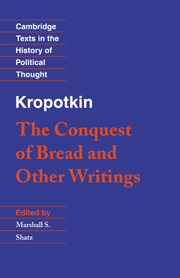If the coming revolution is to be a social revolution, it will be distinguished from all former uprisings not only by its aim, but also by its methods. To attain a new end, new means are required.
The three great popular movements which we have seen in France during the last hundred years differ from each other in many ways, but they have one common feature.
In each case the people strove to overturn the old regime, and spent their heart's blood for the cause. Then, after having borne the brunt of the battle, they sank again into obscurity. A government, composed of men more or less honest, was formed and undertook to organize a new regime: the Republic in 1793, Labour in 1848, the Free Commune in 1871. Imbued with Jacobin ideas, the government occupied itself first of all with political questions, such as the reorganization of the machinery of government, the purifying of the administration, the separation of church and state, civic liberty, and such matters. It is true the workmen's clubs kept an eye on the members of the new government, and often imposed their ideas on them. But even in these clubs, whether the leaders belonged to the middle or to the working classes, it was always middle-class ideas which prevailed. They discussed various political questions at great length, but forgot to discuss the question of bread.
Great ideas sprang up at such times, ideas that have moved the world; words were spoken which still stir our hearts, at the interval of more than a century. But the people were starving in the slums.

